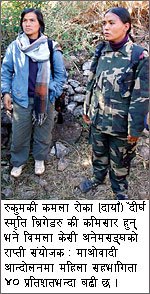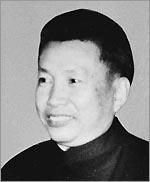
Maoist in Nepal and their allies have denounced attempts to associate them with the Khmer Rouge. The right routinely tries to make such leftist movements appear as if they are following the same path and even call such groups “supporters of Pol Pot.”
Maoists have rejected that comment and the comparison. Here are some excerpts from Dissent Voice.
“A “Terrific Threat” to Regional Stability
Jefferson, Mao, and the Revolution in Nepal”
by Gary Leupp, April 18, 2005
Similar language was used by the U.S. ambassador to South Vietnam in relation to the National Liberation Front (“Vietcong”) in the early 1960s, when the region affected was Southeast rather than South Asia. But (U.S. ambassador to Nepal James Francis) Moriarty doesn’t compare Nepal’s Maoists to the NLF. Nor does he more than subliminally suggest associations with 9-11, Osama bin Laden and Saddam Hussein. Instead he conflates the Communist Party of Nepal (Maoist) with those archfiends of the Cold War era, the deeply anti-Vietnamese Khmer Rouge. The Maoists, Moriarty asserts, could turn Nepal into a “poor man’s Cambodia.” This analogy is significant, since many attacks on Maoists have sought to link them to the group that ruled Cambodia from April 1975 to January 1979. For example, the Federation of American Scientists (FAS) used to publish a “Sendero File” edited by Michael L. Smith, which damned the bourgeoning Maoist movement in Peru, routinely comparing it to the “Maoist” Khmer Rouge.
Using the Khmer Rouge to Attack Maoists
But this association between the Khmer Rouge and Maoism, originally made by the Soviets, is in fact rejected by Maoists themselves. The Revolutionary Internationalist Movement (the “embryonic center of the world’s Maoists” of which the Nepalese party is a member) indeed calls it “a deliberate effort to slander Maoism.” RIM describes the Khmer Rouge as “more a small circle than a party” that operated through a secretive body with an undisclosed leadership simply called “the Organization.” It denounces the Khmer Rouge for indiscriminate and widespread torture, economic disasters such as the abolition of money and proclamation of an immediately classless society, and general failure to understand socialism in the Marxian sense. It notes that the Khmer Rouge never called themselves Maoists, and indeed stated “it is better to learn nothing from foreign experience.” They made use of the monarchy surrounded by Theravada Buddhist traditions, promoted a ferocious nationalism, indulged in fantasies about recreating the glory days of the ancient Khmer Empire, and practiced a curious mix of doctrines that Philip Short, who has written biographies of both Mao Zedong and Pol Pot, declares should not be confused with Maoism. The differences, in Short’s interpretation, result largely from cultural context: “Whereas Mao was the product of an intensely rational, literate society, with highly developed traditions of philosophical debate, [the Khmer Rouge’s] cultural heritage was irrational, oral, guided by Theravada transcendentalism and by k’ruu, spirit-masters, whose truths sprang not from analysis but from illumination… They never once…carried out any social investigation of the social conditions in which that revolution was to come.” (“Investigation of social conditions” is fundamental to Mao’s thought.) “The contrast with Maoist China could hardly be greater,” concludes Short, a former BBC correspondent with no special pro-Mao agenda.
Short describes the one meeting between Mao and Pol Pot in Beijing soon after the Khmer Rouge victory in 1975. The Khmer Rouge had already evacuated Phnom Penh, set the population to rice production, and indicated its intention to immediately construct an ideal classless society. Mao diplomatically chided the Khmer leader, who had just arrived from talks in Hanoi: “[C]ertainly you have made mistakes. So rectify yourselves: do rectification!” Alluding to his visitor’s intention to eliminate class distinctions overnight, he noted that in China after many years of revolution, “Salaries are not equal. We have a slogan of equality---but we don’t carry it out. How many years will it take to change that? Until we become communist? …[T]his matter is not clear.” For Mao, the construction of socialism itself would require a very long period of arduous struggle, with the possibility of capitalist restoration seriously real at every step. Throughout the socialist period, there will be class division and class struggle. Thus for him the Cambodian experiment must have looked very dubious.
The Khmer Rouge crazies in fact were a unique phenomenon, not a product of any sort of Marxism so much as the product of saturation bombing that had destroyed the nation’s agricultural infrastructure, killed off 75% of its draft animals, displaced millions and thrown the culture completely off-balance. To this devastation we might add some of the cultural features Short finds relevant. In any case, from a certain anticommunist perspective, had the Khmer Rouge not existed in 1975 they would have had to be invented---if only to validate the longstanding prediction that a communist victory in Indochina would somehow produce a bloodbath. This just didn’t happen in Vietnam or Laos. But the Cambodian “holocaust” could be used to partly rationalize the carnage of the broadened Vietnam conflict that had killed about three million people, and to justify ongoing anticommunist counterinsurgency efforts around the world. (Meanwhile the horrific loss of life attributed to the Khmer Rouge could obscure that inflicted by U.S. bombing and related issues such as famine. One rarely sees a breakdown of casualties from 1970 to 1979 distinguishing the latter from the former, and of course the victims figure itself ranges significantly between 700,000 and two million.)

Pol Pot



No comments:
Post a Comment